L
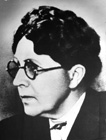 Ladygina-Kots Nadezhda Nikolayevna (1889-1963) – Russian psychologist, expert in Zoopsychology, Child Psychology and Comparative Psychology. Conducted research in the area of perception, emotions, memory, and intellect of anthropoid apes, studying the development of mentality in a large evolutionary context. Conducted a comparative analysis of the specifics of free behavior of chimpanzees and of her own sun Rudolf at the age of 1.5-4 years. Demonstrated that anthropoid apes possess eye-mindedness and identified a number of factors distinguishing pre-labor activity of anthropoids from labor activity of humans. Main publications: "Baby Chimpanzee and Human Baby in their Instincts, Emotions, Games, Habits and Expressive Movements", 1935; "Perception of Quantity by Animals", 1941; "Constructive and Instrumental Activity of Anthropoid Apes", 1959.
Ladygina-Kots Nadezhda Nikolayevna (1889-1963) – Russian psychologist, expert in Zoopsychology, Child Psychology and Comparative Psychology. Conducted research in the area of perception, emotions, memory, and intellect of anthropoid apes, studying the development of mentality in a large evolutionary context. Conducted a comparative analysis of the specifics of free behavior of chimpanzees and of her own sun Rudolf at the age of 1.5-4 years. Demonstrated that anthropoid apes possess eye-mindedness and identified a number of factors distinguishing pre-labor activity of anthropoids from labor activity of humans. Main publications: "Baby Chimpanzee and Human Baby in their Instincts, Emotions, Games, Habits and Expressive Movements", 1935; "Perception of Quantity by Animals", 1941; "Constructive and Instrumental Activity of Anthropoid Apes", 1959.
 Lange Nikolay Nikolayevich (1858-1921) – Russian psychologist, one of the founders of Experimental Psychology in Russia. Student of reputed psychologist Vladislavlev (1882). Completed internship in France and in Germany (at Wundt's Institute of Psychology in Leipzig). Created the Cabinet of Experimental Psychology at the University of Novorossiya (Odessa), the first university laboratory of Experimental Psychology in Russia. Developed objective methods of research of consciousness, created the "motor theory of concentration" (fluctuations of concentration are determined by the eye movement when scanning an image). Introduced the notion of "mental universe", from the "dawn of consciousness" of lower animals to high stages of its development in humans as social beings. Preempted the idea of different levels of construction of movement, and substituted the notion of reflex as an "arc" with that of a "circle". Identified different stages in psychological evolution, correlating them with changes to nervous system. Stressed the role of culture, history and society in relation to the level of psychological regulation of a person's behavior. Ascribed the key role to language. Eventually moved away from Darwinism to true historicism. Main publications: "Components of Volitions", 1890; "Psychology", 1914.
Lange Nikolay Nikolayevich (1858-1921) – Russian psychologist, one of the founders of Experimental Psychology in Russia. Student of reputed psychologist Vladislavlev (1882). Completed internship in France and in Germany (at Wundt's Institute of Psychology in Leipzig). Created the Cabinet of Experimental Psychology at the University of Novorossiya (Odessa), the first university laboratory of Experimental Psychology in Russia. Developed objective methods of research of consciousness, created the "motor theory of concentration" (fluctuations of concentration are determined by the eye movement when scanning an image). Introduced the notion of "mental universe", from the "dawn of consciousness" of lower animals to high stages of its development in humans as social beings. Preempted the idea of different levels of construction of movement, and substituted the notion of reflex as an "arc" with that of a "circle". Identified different stages in psychological evolution, correlating them with changes to nervous system. Stressed the role of culture, history and society in relation to the level of psychological regulation of a person's behavior. Ascribed the key role to language. Eventually moved away from Darwinism to true historicism. Main publications: "Components of Volitions", 1890; "Psychology", 1914.
Lazurskiy Aleksandr Fedorovich (1874-1917) – Russian psychologist and physician, the founder of Differential Psychology. For many years headed the Laboratory of Psychology at Bekhterev Psychoneurological Research Institute. Associated individual abilities with the function of nervous system. Demonstrated the importance of the scientific theory of individual differences and developed the methodology of natural experiment providing more objective data compared to laboratory tests. Opposed both the pragmatic approach of Testology and the ideas of Wundt, Diltey and others that observation and compassion are the best source for studying the mental attributes of personality. Developed the first personal typology and the system of diagnosing and correcting different types of deviations in the process of psychological development of a child. Main publications: "Essay on the Science of Character", 1909; "On Natural Experiment", 1911; "General and Experimental Psychology", 1912; "Classifications of Personalities", 1922.
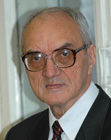 Lebedev Artur Nikolayevich – Russian psychophysiologist, Doctor of Biology, professor, worked as the Head of the Laboratory of General Psychophysiology at the Institute of Psychology of the Russian Academy of Science. Discovered quantitative regularities that determine the dependence of the volume of short-term memory and the rate of choice reaction on the parameters of a person's encephalogram and the volume of the given range of stimuli. Proposed the idea on the cyclic structure of neuronic codes of long-term memory. His ideas are expressed in his work "Psychophysiology and Psychophysics", 1977.
Lebedev Artur Nikolayevich – Russian psychophysiologist, Doctor of Biology, professor, worked as the Head of the Laboratory of General Psychophysiology at the Institute of Psychology of the Russian Academy of Science. Discovered quantitative regularities that determine the dependence of the volume of short-term memory and the rate of choice reaction on the parameters of a person's encephalogram and the volume of the given range of stimuli. Proposed the idea on the cyclic structure of neuronic codes of long-term memory. His ideas are expressed in his work "Psychophysiology and Psychophysics", 1977.
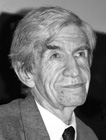 Leontyev Aleksey Alekseyevich (1936-2004) – Russian psychologist, leading expert in the area of Psycholinguistics, Doctor of Philology, Doctor of Psychology, professor, Fellow of the Russian Academy of Education. Professor at the Department of Psychology of Moscow Lomonosov State University since 1966. The author of theoretical works in the area of speech activities. Developed the most popular theory of speech formation. Main publications: "Psycholinguistics", 1967; "Psycholinguistical Units and the Formation of Speech Expression", 1969; "Psychology of Communication", 1974.
Leontyev Aleksey Alekseyevich (1936-2004) – Russian psychologist, leading expert in the area of Psycholinguistics, Doctor of Philology, Doctor of Psychology, professor, Fellow of the Russian Academy of Education. Professor at the Department of Psychology of Moscow Lomonosov State University since 1966. The author of theoretical works in the area of speech activities. Developed the most popular theory of speech formation. Main publications: "Psycholinguistics", 1967; "Psycholinguistical Units and the Formation of Speech Expression", 1969; "Psychology of Communication", 1974.
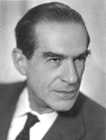 Leontyev Aleksey Nikolayevich (1903-1979) – Russian psychologist, one of the founders of the psychological activity theory. Professor at Moscow State University (1941), Dean of the Faculty of Psychology of Moscow State University (1966). Doctor of Science, professor, Fellow of the Academy of Pedagogical Science of RSFSR and USSR. In 1920s developed, along with L. Vygotsky and A. Luria, the cultural-historical theory, conducted a series of experimental studies, describing the mechanism of formation of higher mental functions as a process of "in-growth", or interiorization of external forms of instrumental mediated activities into internal psychological processes. His experimental and theoretical works are dedicated to problems of psychological development, psychology of perception, thought etc. Proposed the general psychological activity theory that offers structural analysis of activity identifying its components and levels that form a system functioning as a whole. Paid special attention to the correlation between the structure of activity and the structure of consciousness. Distinguished between significance and meaning. His activity theory was further developed by different branches of psychology. His postulate on leading activity and its determining influence on the mental development of a child prepared the ground for the concept of periodization of mental development of children proposed by D. Elkonin.
Leontyev Aleksey Nikolayevich (1903-1979) – Russian psychologist, one of the founders of the psychological activity theory. Professor at Moscow State University (1941), Dean of the Faculty of Psychology of Moscow State University (1966). Doctor of Science, professor, Fellow of the Academy of Pedagogical Science of RSFSR and USSR. In 1920s developed, along with L. Vygotsky and A. Luria, the cultural-historical theory, conducted a series of experimental studies, describing the mechanism of formation of higher mental functions as a process of "in-growth", or interiorization of external forms of instrumental mediated activities into internal psychological processes. His experimental and theoretical works are dedicated to problems of psychological development, psychology of perception, thought etc. Proposed the general psychological activity theory that offers structural analysis of activity identifying its components and levels that form a system functioning as a whole. Paid special attention to the correlation between the structure of activity and the structure of consciousness. Distinguished between significance and meaning. His activity theory was further developed by different branches of psychology. His postulate on leading activity and its determining influence on the mental development of a child prepared the ground for the concept of periodization of mental development of children proposed by D. Elkonin.
Lesgaft Pyotr Frantsevich (1837-1909) – Russian educator, psychologist, expert in anatomy. Developed the theory of "Physical Education", the main goal of which was described as "conscious physical work". Physical exercise was subordinated to a wider task of general psychophysical development of personality. Control of the body is a category of sensor-intellectual character. Conscious control of behavior is possible through verbal means. The ability to move from affect regulation to verbal regulation was considered a key factor for the development of self-consistent behavior. Physical education, therefore, in Lesgaft's system plays a role of a basis for intellectual education in a sense that a physically developed and trained organism represents a propitious ground for spiritual activities.
Levitov Nikolay Dmitriyevich (1890-1971) – Russian psychologist, Doctor of Psychology, professor. In 1938-1959 was the head of Laboratory at the Institute of Psychology (Moscow). Headed the Department of Psychology of Moscow Krupskaya Regional Pedagogical Institute (1959-1962). In 1920s developed a battery of tests for psychodiagnostics of intellectual ability and technical intellect. Expert in the area of Developmental and Pedagogical Psychology. Attached special importance to the problem of abilities and the problem of mental conditions (in relation to preparedness to accomplish labor and study tasks). Main publications: "Essays on Pedagogical Psychology", 1946; "Psychology of High School Students", 1955; "Problems of Psychology of Character", 1952, 1956, 1969; "Abilities and Interests", 1962.
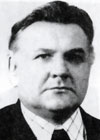 Lomov Boris Fedorovich (1927-1989) – Russian psychologist, Doctor of Psychology, professor, Associate of the Academy of Pedagogical Science of USSR, Associate of the Academy of Sciences of USSR, founder and director of the Institute of Psychology of the Academy of Sciences of USSR, founder and Senior Editor of the "Psychological Journal". Along with B. Ananyev organized the Faculty of Psychology at Leningrad State University (1966) and became its first Dean. Expert in the area of General, Engineering, Educational Psychology and Psychology of Communication. One of the founders of Russian Engineering Psychology. In the area of general psychological problems, researched the specifics of spatial function and bimanual tactile perception, the shaping and transformation of sensitive images and visual skills. Developed the concept of the levels of anticipation processes in activity structure. In his research of psychological communicative functions considered communication as a special sphere of human existence, distinct from the sphere of activity, the system of subject-subject relationships with a specific structure and functions that is at the same time organically related to other areas of human activity. Paid special attention to the problems of Managerial Psychology and to the study of the methodology of Psychology. Main publications: "Formation of Visual Knowledge and Skills of Students", Leningrad, 1959; "Tactile Perception in the Process of Cognition and Labor" (in collab. with B. Ananyev, L. Vekker, A. Yarmolenko), Leningrad, 1959; "Man and Technology", Moscow, 1966; "Man in the Management System", Moscow, 1967; "Legal, Social and Psychological Aspects of Management" (in collab.), Moscow, 1972; "Psychological Science and Social Practice", Moscow, 1973; "Anticipation in the Structure of Activity" (in collab.), Moscow, 1980; "Men and Automata", Moscow, 1984; "Communication and Cognition", Moscow, 1984; "Methodological and Theoretical Problems of Psychology", Moscow, 1984; "Image in the System of Mental Activity Regulation" (in collab.), Moscow, 1986.
Lomov Boris Fedorovich (1927-1989) – Russian psychologist, Doctor of Psychology, professor, Associate of the Academy of Pedagogical Science of USSR, Associate of the Academy of Sciences of USSR, founder and director of the Institute of Psychology of the Academy of Sciences of USSR, founder and Senior Editor of the "Psychological Journal". Along with B. Ananyev organized the Faculty of Psychology at Leningrad State University (1966) and became its first Dean. Expert in the area of General, Engineering, Educational Psychology and Psychology of Communication. One of the founders of Russian Engineering Psychology. In the area of general psychological problems, researched the specifics of spatial function and bimanual tactile perception, the shaping and transformation of sensitive images and visual skills. Developed the concept of the levels of anticipation processes in activity structure. In his research of psychological communicative functions considered communication as a special sphere of human existence, distinct from the sphere of activity, the system of subject-subject relationships with a specific structure and functions that is at the same time organically related to other areas of human activity. Paid special attention to the problems of Managerial Psychology and to the study of the methodology of Psychology. Main publications: "Formation of Visual Knowledge and Skills of Students", Leningrad, 1959; "Tactile Perception in the Process of Cognition and Labor" (in collab. with B. Ananyev, L. Vekker, A. Yarmolenko), Leningrad, 1959; "Man and Technology", Moscow, 1966; "Man in the Management System", Moscow, 1967; "Legal, Social and Psychological Aspects of Management" (in collab.), Moscow, 1972; "Psychological Science and Social Practice", Moscow, 1973; "Anticipation in the Structure of Activity" (in collab.), Moscow, 1980; "Men and Automata", Moscow, 1984; "Communication and Cognition", Moscow, 1984; "Methodological and Theoretical Problems of Psychology", Moscow, 1984; "Image in the System of Mental Activity Regulation" (in collab.), Moscow, 1986.
Lopatin Lev Mikhaylovich (1855-1920) – Russian psychologist and philosopher. President of the Moscow Psychological Society after the death of N. Grot (1899). Perceived psychology as a methodology of all human sciences, a science on the laws and processes of mental life. Based his views on the philosophy of V. Solovyev and the theories of Spinoza and Leibnitz. Considered Psychology to be rather a philosophical than a natural science. Developed the thesis on direct and spontaneous knowledge of the inner world. Any cognition theory is built on a psychological foundations. Was interested in the problems of will. Associated the freedom of will with the development of ethics and considered ethical problems to be one of the main subjects of psychology. The freedom of will is expressed in creativity. These ideas are stated in his "Positive Tasks of Philosophy", 1911; and "The Course of Psychology", 1903.
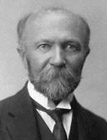 Losskiy Nikolay Onufriyevich (1870-1965) – Russian philosopher and psychologist, professor of St. Petersburg University. Emigrated to Czechoslovakia in 1922. Professor at the Russian Ecclesiastical Academy in New York (1945). The founder of "Russian Intuitivism". Indicated that experience is not an external phenomenon in relation to cognition, but is internal and immanent to the object of cognition and therefore directly reflects its essence. Emphasized that the man as a medium of concrete and ideal existence stands above natural laws, including the laws of cause and effect. Manifestations of own spiritual power of a person are correlated to the person's own interests and needs. Marked that the individualistic ideology reduces the goal of the human life to self-preservation. Extreme individualism results in loss of personality. Researched the specifics of Russian mentality and "Russian character". Main publications: "Substantiation of Intuitivism", 1906; "Main Psychological Concepts from the Point of View of Voluntarism", 1903; "The Character of the Russian People", 1957.
Losskiy Nikolay Onufriyevich (1870-1965) – Russian philosopher and psychologist, professor of St. Petersburg University. Emigrated to Czechoslovakia in 1922. Professor at the Russian Ecclesiastical Academy in New York (1945). The founder of "Russian Intuitivism". Indicated that experience is not an external phenomenon in relation to cognition, but is internal and immanent to the object of cognition and therefore directly reflects its essence. Emphasized that the man as a medium of concrete and ideal existence stands above natural laws, including the laws of cause and effect. Manifestations of own spiritual power of a person are correlated to the person's own interests and needs. Marked that the individualistic ideology reduces the goal of the human life to self-preservation. Extreme individualism results in loss of personality. Researched the specifics of Russian mentality and "Russian character". Main publications: "Substantiation of Intuitivism", 1906; "Main Psychological Concepts from the Point of View of Voluntarism", 1903; "The Character of the Russian People", 1957.
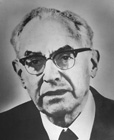 Luria Aleksandr Romanovich (1902-1977) – Russian psychologist, professor, Doctor of Education, Doctor of Medicine, Fellow of the Academy of Pedagogical Science of RSFSR and USSR, International Fellow of American Academy of Arts and Sciences. Founder of Neuropsychology. In 1968-1977 Head of the Department of Neuropsychology and Pathopsychology at the Psychology Faculty of Moscow Lomonosov State University. In 1920s, as a student of L. Vygotsky, took part in creating the cultural-historical theory of development of mental processes. In the area of Genetical Psychology, researched the role of genetic and social factors in the development of mental processes on twins. Studied cerebral mechanisms of mental processes and their disturbance due to various types of brain impairment. Developed a new theory of localization of higher mental functions, contributed to the understanding of the nature of speech disorders. Main publications: "Sketches of the History of Behavior", 1930; "Speech and Intellect in Child Development", 1927; "The Basics of Neuropsychology", 1973.
Luria Aleksandr Romanovich (1902-1977) – Russian psychologist, professor, Doctor of Education, Doctor of Medicine, Fellow of the Academy of Pedagogical Science of RSFSR and USSR, International Fellow of American Academy of Arts and Sciences. Founder of Neuropsychology. In 1968-1977 Head of the Department of Neuropsychology and Pathopsychology at the Psychology Faculty of Moscow Lomonosov State University. In 1920s, as a student of L. Vygotsky, took part in creating the cultural-historical theory of development of mental processes. In the area of Genetical Psychology, researched the role of genetic and social factors in the development of mental processes on twins. Studied cerebral mechanisms of mental processes and their disturbance due to various types of brain impairment. Developed a new theory of localization of higher mental functions, contributed to the understanding of the nature of speech disorders. Main publications: "Sketches of the History of Behavior", 1930; "Speech and Intellect in Child Development", 1927; "The Basics of Neuropsychology", 1973.
Lebedev Vladimir Ivanovich – Russian psychologist, physician, doctor of psychology, professor. L. headed the section of medical-psychological training in the Cosmonaut training centre. L.investigated the problem of extreme psycho-neurology, human behavior, psychic condition, people’s interaction under special conditions. He is one of the founders of new branch in psychology – cosmonaut psychology. The main works: “Psychological peculiarities of cosmonauts’ activity” (1971), “Personality in extreme conditions” (1989).
Levitov Nikolay Dmitrievich (1890-1971) – Russian psychologist, doctor of psychology, professor. His main interest was in the psychology of abilities, the problem of mental conditions. L. favoured the restoration of native labor psychology. The main works: “Essays on educational psychology” (1946), “Psychology of senior school children” (1955).
Leytes Nata Semionovich - Russian psychologist, doctor of psychology, professor. L. is one of the leading experts in the problem of gifted child, of the role of intellectual activity in the structure of developing intellect, and other. The main works: “The experiment of psychological temperament characteristics” (1956), “On intellectual endowments” (1960), “Intellectual abilities and age” (1971), “In addition to the problem of psychic activity” (1977), “Early revelation of endowments” (1988).